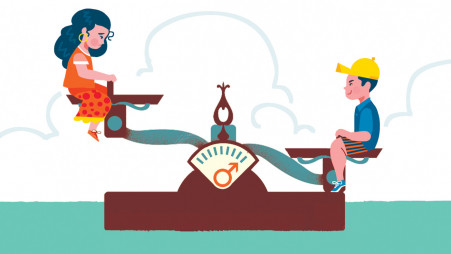Towards creating a more equal society
A new year is here. Perhaps a fitting time to reflect on and talk about plight of women and gender equality

On the question of equality, there can only be compromise.
Part of the problem in ensuring that men, women, and everyone else, in between and beyond, are treated with a level of respect worthy of human beings is the assumption that the answer is a simple one. Rhetorical landmines litter this path toward equity and equality, the ignorant oftentimes treated with condescension and the all-too-aware dismissed with disdain.
Both ignore the impossibility that is fundamental to ensuring justice on the question of gender equality: There is no right answer. Or, perhaps, at the very least, there is one answer.
I'll prevent myself from providing specific examples of the questions and answers which have taken up most discourse on the matter. I'm sure those reading this are well aware of the words, phrases, and concepts which bombard these conversations, creating battlefields where there should be open invitations to cross into each other's borders and ensure that there is some level of understanding afforded on every side.
This understanding is not meant to be provided to misogynistic or transphobic ideas, but to the series of events which lead a person to acquire such ideas in the first place. From the underfunded education system to the repressive and retrograde attitudes reserved for open discussions on sex and sexuality, from environments of injustice and corruption and an unreliable judiciary to hyper-capitalistic forays into self-fulfillment, amongst a myriad other factors, all contribute to the reality women face every day, preventing even the most hopeful amongst us from believing in some fictional future of our nation's prosperity.
Considering the complexities which contribute to our identification of gender, sex, and everything else in between, inevitably present in a society whose identity is constantly in flux, unable to decide where exactly notions of Bangladeshiness and Bengaliness lie, how can one even begin to state that equality means 'this' and equity means 'that' and fairness is 'here' and not 'there'?
The very attempt seems foolish, as each side drops 'truth' bombs, creating splits within a nation that requires unity and empathy instead of echo chambers and bubbles, propagating a culture which seeks validation at the cost of seeking the truth.
The assumption that there is an answer that can be known, instead of one that can be applied and then observed, is at the core of these battles for the one-and-only truth. The truth, much like our understanding of and relationship with gender, is equally fluid, and must constantly be questioned, reassessed, and changed in order to ensure what we can reasonably consider to be fair at a particular moment in space-time.
The rigidities of the legal system, of traditions, of culture, of religion, of identity, betray a lack of understanding of how history too is a river gone wild, whose path through the past proves, if anything, that we constantly make mistakes, and that identities are products of vast wells of influence and much more complex than we would like them to be.
To stay within the convictions afforded to us by our personal environments, education, and privilege is to ignore the series of unfortunate events and circumstances which allow for monsters to emerge amongst men, allowing for a status quo which promotes objectification and a culture of rape. This is indicative of a far wider problem with oppression that permeates the relationships we have with each other.
The real tragedy, then, is not that such individuals exist or that such retrograde thinking exists, but that we are active participants in nurturing an environment which leads to both. Despite our elevated positions in life, we constantly fail to provide spaces of self-expression to those who must listen to the most: those who disagree with us. Sons inherit the prejudices of their fathers, daughters inhabit roles reserved by their mothers, fulfilling prophecies of unhappiness and abuse, sacrificing themselves as spokes on a forever-turning wheel of time that propels Bangladesh into its postmodern dream of golden prosperity.
NGOs and literary fests and foreign aid will do little to solve the problem of powerlessness: No sense of morality and clear judgement can exist in a population whose daily struggles overwhelm its existence. The new slaves of the 21st century have little time for self-reflection and empathy, occupied as they are with some fictional idea of success and a very real struggle for survival.
Women floored by the raised hands of men is but one symptom of a society which has without remorse accepted the homelessness of children. What version of equality can this society even pretend to peddle?
One that satisfies the arbitrary numbers of the SDGs perhaps, but none that will ever allow us to say, with some conviction, that we are working towards creating a "more" equal society for both men and women, let alone everyone else in between.

SN Rasul teaches English at North South University.
Disclaimer: The views and opinions expressed in this article are those of the authors and do not necessarily reflect the opinions and views of The Business Standard.



 Keep updated, follow The Business Standard's Google news channel
Keep updated, follow The Business Standard's Google news channel
















